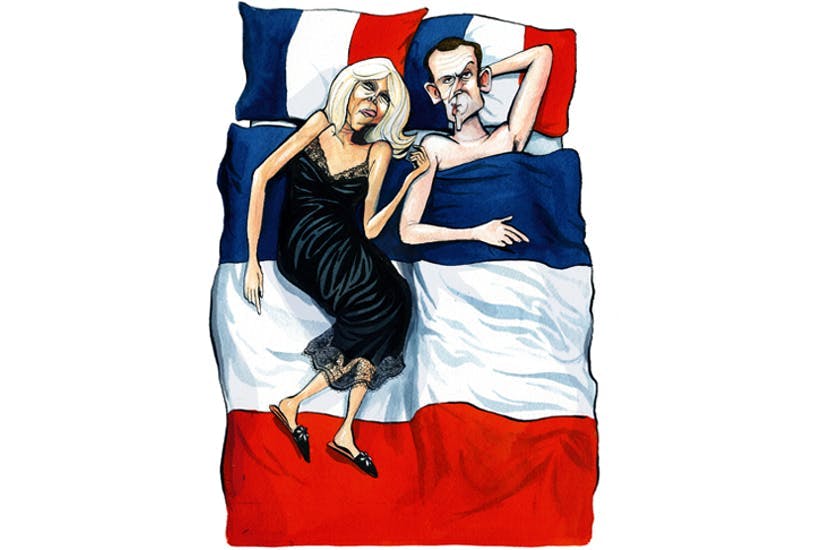In 2015, millions of French people tuned in to watch French Bashing, a television documentary which sought to explain why those horrible Anglo-Saxons were so consistently mean about France. The whole gamut of historic insults and stereotypes were analysed in the 90-minute film, from popular portrayals of the country as an ungovernable nation of idle protesters to the ‘cheese-eating surrender monkeys’ moniker that dates back to 1995.
It struck a chord at a time when the country was near rock-bottom, confused under the presidency of Francois Hollande, hit by terrorism, high unemployment and an unrelenting stream of negative international media coverage. ‘French-bashing had become a sort of buzzword for the government,’ recalled the documentary maker, Jean-Baptiste Peretie, this week.
David Cameron and his Cabinet looked on as so many had done before — with a detectable sense of superiority – especially when Hollande bungled an attempt to introduce a new 75-percent top tax rate. The British premier offered to ‘roll out the red carpet’ for French exiles.
Three years on, the visit of Emmanuel Macron to Britain tomorrow provides an opportunity to ponder how the balance of fortune has tipped in one of the world’s oldest rivalries. Because no one is sneering at France any more. Though many of Macron’s domestic reforms are yet to bear fruit, even the most ardent critics of the new French leader would agree that he has one achievement under his belt: he has silenced les French bashers. When he says ‘France is back’, people take him seriously.
The energetic 40-year-old is the face of modern start-up politics, thanks to his newly created centrist En Marche party. He has positioned himself as the man with the vision for a reformed EU and is leading European diplomacy in the Middle East and Asia. He has outmanoeuvred the trade unions and passed the first of his economic reforms. Growth is up, taxes are down and US pop stars and business magnates have beaten a path to the grand doors of the Elysee Palace.
The contrast between Macron’s France and Brexit Britain looks stark. Paris even won the 2024 Olympics last September, and then secured the headquarters of the European banking regulator once it leaves London. And unlike Theresa May, Macron can claim to have reinforced the special relationship with the US President Donald Trump.
This challenges the established order. We Brits have grown used to looking across the channel to see visions of blocked motorways, long dole queues and the spectacle of irresolute French leaders backtracking in the face of street protests. No Gallic president in recent memory, with the possible exception of Nicolas Sarkozy in the early part of his term, has provoked anything approaching jealousy or admiration in the UK.
But Macron is different. Above all, he has much to endear himself to the traditional French bashers on the conservative right in Britain. He’s an open admirer of business, is at ease with the wealthy, speaks the language of finance and is a leading advocate for open markets and trade. Aides tell how he has brought private-sector management practices to the machinery of government.
Historic Anglo-French rivalry will make publicly admiring Macron impossible for many on the British right. Reassuringly, there’s still an opportunity to poke fun at his flowery speeches and his seemingly Napoleonic ego. He can be dismissed as just a ‘French Tony Blair’. Isn’t it true that every trend starts in Britain first and arrives in France 20 years later?
I predict that French-bashing hasn’t ended. It’s just a temporary hiatus in a thousand-year-old national sport. For when Macron turns the screws in the Brexit negotiations, lures business away from London and ramps up pressure on Britain over migrants in northern France, the old impulse will return. But it will be different. There’ll be less mockery, more fear.
Adam Plowright is the author of The French Exception. Emmanuel Macron: The Extraordinary Rise and Risk.






Comments